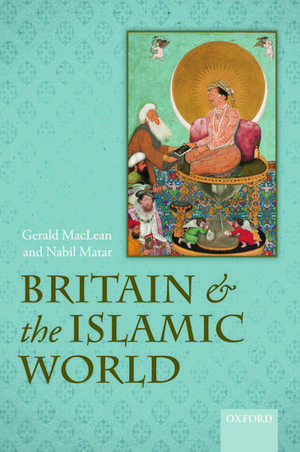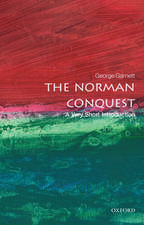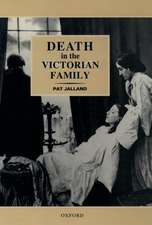Britain and the Islamic World, 1558-1713
Autor Gerald MacLean, Nabil Mataren Limba Engleză Hardback – 26 mai 2011
Preț: 446.83 lei
Preț vechi: 517.34 lei
-14% Nou
Puncte Express: 670
Preț estimativ în valută:
85.50€ • 89.27$ • 70.76£
85.50€ • 89.27$ • 70.76£
Carte tipărită la comandă
Livrare economică 24-31 martie
Preluare comenzi: 021 569.72.76
Specificații
ISBN-13: 9780199203185
ISBN-10: 0199203180
Pagini: 350
Ilustrații: 11 black and white illustrations, 1 map
Dimensiuni: 163 x 241 x 26 mm
Greutate: 0.68 kg
Editura: Oxford University Press
Colecția OUP Oxford
Locul publicării:Oxford, United Kingdom
ISBN-10: 0199203180
Pagini: 350
Ilustrații: 11 black and white illustrations, 1 map
Dimensiuni: 163 x 241 x 26 mm
Greutate: 0.68 kg
Editura: Oxford University Press
Colecția OUP Oxford
Locul publicării:Oxford, United Kingdom
Recenzii
This is a book centred on the enterprise of five generations of British seamen and merchant-venturers exploring the Islamic East. It is a well-known story of British achievement but, instead of staying within the stately mansion of this progression towards glory and empire, the two authors keep throwing open the windows to offer us fresh insights, new horizons of inquiry, as well as skipping out through a back door to give us a witheringly close examination of the fabric. This is an uplifting, intriguing and inquiring survey, which leaves the reader grateful for the breadth and depth of their scrutiny.
Through masterful use of a variety of original sources, including plays, books, pamphlets, archival records, and illustrations, MacLean and Matar make an innovative and persuasive argument. They demonstrate the diversity and complexity of English perceptions of both Muslims and Islam during this vital period in the development of English culture and its early relations with the peoples and religions of the Islamic world. A variety of scholars, students, and general readers will learn much from this accessible and well-informed volume.
The constant drawing upon, and in many cases the relentless misinterpretation of, history makes the need for rigorous, scholarly assessments of relations between the western and Islamic worlds all the more vital. In their work Britain and the Islamic World 1558-1713, Gerald Maclean and Nabil Matar provide a timely reminder of the complexities of these relationships and demonstrate how some attitudes have remained with us since the early modern period ... It was an era of cooperation and conflict. Extensive end-notes provide a wealth of additional information and sources for the interested reader, vital in a book whose only significant flaw is its brevity. Gerald Maclean and Nabil Matar's work is vital for understanding not only Islam during the period 1558-1713, but for deepening understandings of western relations with the Islamic world today.
Nineteenth century observers would say that the British Empire was an Islamic one; be that as it may, before Empire there was trade- and lots of it. Nabil Matar and Gerald MacLean's book, Britain and the Islamic World, 1558-1713 (Oxford: Oxford University Press, 2011), though, goes beyond trade- there was also lots of curiosity, in Britain and abroad, about the strange new peoples and products beginning to move more freely across the world than ever before. It is this aspect of British-Muslim interaction – (or more accurately interactions; the Islamic world was vast and encompassed a dizzying diversity of peoples and cultures) that Matar and MacLean emphasise- the wondering, bemused, gleeful, fascinated, at times despairing accounts of travellers, diplomats, traders – and pirates and their captives- as they sought to convey their impressions of the new worlds they encountered.
Through masterful use of a variety of original sources, including plays, books, pamphlets, archival records, and illustrations, MacLean and Matar make an innovative and persuasive argument. They demonstrate the diversity and complexity of English perceptions of both Muslims and Islam during this vital period in the development of English culture and its early relations with the peoples and religions of the Islamic world. A variety of scholars, students, and general readers will learn much from this accessible and well-informed volume.
The constant drawing upon, and in many cases the relentless misinterpretation of, history makes the need for rigorous, scholarly assessments of relations between the western and Islamic worlds all the more vital. In their work Britain and the Islamic World 1558-1713, Gerald Maclean and Nabil Matar provide a timely reminder of the complexities of these relationships and demonstrate how some attitudes have remained with us since the early modern period ... It was an era of cooperation and conflict. Extensive end-notes provide a wealth of additional information and sources for the interested reader, vital in a book whose only significant flaw is its brevity. Gerald Maclean and Nabil Matar's work is vital for understanding not only Islam during the period 1558-1713, but for deepening understandings of western relations with the Islamic world today.
Nineteenth century observers would say that the British Empire was an Islamic one; be that as it may, before Empire there was trade- and lots of it. Nabil Matar and Gerald MacLean's book, Britain and the Islamic World, 1558-1713 (Oxford: Oxford University Press, 2011), though, goes beyond trade- there was also lots of curiosity, in Britain and abroad, about the strange new peoples and products beginning to move more freely across the world than ever before. It is this aspect of British-Muslim interaction – (or more accurately interactions; the Islamic world was vast and encompassed a dizzying diversity of peoples and cultures) that Matar and MacLean emphasise- the wondering, bemused, gleeful, fascinated, at times despairing accounts of travellers, diplomats, traders – and pirates and their captives- as they sought to convey their impressions of the new worlds they encountered.
Notă biografică
Since 1993 Gerald MacLean has worked on the nature and range of East-West encounters and authored two books on Anglo-Ottoman relations during the early modern period, both of which have appeared in Turkish translation. He is a founding member of The Evliya Çelebi Way Project, an international group of scholars and equestrians who travelled across western Anatolia on horseback in the autumn of 2009 following the route of the great Ottoman travel writer and historian. This project of historical re-enactment has been supported by the Turkish Ministry of Culture and has established a sustainable trekking route between Istanbul and Kütahya. In the spring of 2011 he and the team will follow Evliya's route on horseback from Gaziantep to Aleppo and back to Sanliurfa to establish a second sustainable trekking route within the frame of the Turkish-Syrian Interregional Cooperation Programme.Nabil Matar completed his B.A. and M.A. at the American University of Beirut, and his Ph.D. at Cambridge University. He taught at Jordan University and the American University of Beirut, and received postdoctoral grants from the British Council (Clare Hall, Cambridge University) and from Fulbright (Harvard Divinity School). In 1986, Dr. Matar moved to the United States and started teaching in the Humanities Department at Florida Institute of Technology. In 1997, he became the Department Head and served until 2007 when he moved to the English Department at the University of Minnesota. He is Presidential Professor in the President's Interdisciplinary Initiative on Arts and Humanities and teaches in the departments of English and History, and in the Religious Studies Program. Dr. Matar's research in the past two decades has focused on relations between early modern Britain, Western Europe, and the Islamic Mediterranean. He is co-executive editor of the Journal of Early Modern History (Brill).









